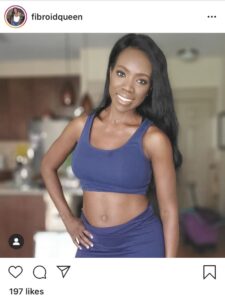Black women and fibroids just seem to go together. About 80% of all black women develop fibroids by the time they hit their 50s. In comparison, only 70% of white women will get these tumors in their lifetime. And it happens sooner too: almost 25% of black women aged 18-30 30 have fibroids. That's another awful contrast, since just 6% of white women that age have them. Black women are also two to three times more likely to have recurring fibroids or suffer from complications. This means that the rate of fibroid development is much higher among black women, but that's not the only concern.
Now, all women face healthcare challenges due to lacking research into women's unique disease causes. (That's why President Biden signed an executive order designed to advance research and data collection to advance women's health outcomes.) Black women are far more likely to end up in the hospital because of fibroid complications. Even worse? Because they have more fibroids, traditional screening methods often miss endometrial cancers in Black women, resulting in their 90% higher mortality rate for this cancer type, according to a new study in JAMA Oncology.
Those are scary statistics. And that's why many women impacted by these benign tumors are taking steps to raise fibroid awareness. Another motivating reason? They want to help other black women gain the information needed to receive high-quality fibroid care, that doesn’t always involve a hysterectomy. Because black women are also at least twice as likely as white women to get a hysterectomy due to fibroids, even when they're still of childbearing age. But they need some encouragement to start speaking about their experiences. Something our uterine fibroid embolization specialist Dr. Eric Hardee recently tried doing, thanks to this interview with NBC news.
Now, those missions line up perfectly with our own. So, today, we salute two of the women crusading for black women with fibroids as our Women Crushes of the Week. 
When LaToya. Dwight was diagnosed with fibroids, her doctors offered a hysterectomy. But, as she explained in a recent interview, “I did not know what fibroids were, and was not given any resources… That did not sit well with me and made me do my research.”
Thankfully, that research led her to lifestyle changes, and a less invasive treatment option. Following her decision, she said, “I realized that a lot of women do not know where to turn because they are typically given the recommendation of having a hysterectomy. And while there is nothing wrong with having one, statistically, 60% of hysterectomies are not needed.” To help fill that information gap, she started the Fibroid Pandemic platform.
Among other resources, Dwight shares information that will help Black women address fibroid symptoms holistically. Specifically, she helps target factors that may be responsible for Black women’s increased fibroid risks. One key lifestyle change she advocates? Changing cosmetics brands. Especially hair care products, since many products marketed for black hair care contain strong chemicals that have been linked to increased fibroid risk. This is very important information, as are the tips our next #WCW shares through her platforms.
Registered nurse and fitness trainer Phyllis Frempong expressed concern about Black women’s healthcare equality: “Black women are last when learning the information needed to maximize our options. In the medical system, it has been this way for a long time. It has been set up for us to be at a disadvantage; therefore, we are required to educate and empower ourselves to stay abreast of what is going on.”
She uses her Instagram platform to advocate fibroid fighting fitness routines. As we know, maintaining a healthy weight can help minimize fibroid symptoms and growth, likely because carrying extra pounds can mess with your hormones.
Still, Ms. Frempong knows that talking fibroids isn’t easy. She says, “I grew up in an African household, so talking about medical issues was not encouraged. I remember my mom coming home really drained and tired, and asking her what happened. After initially dismissing me, she later said that her doctor informed her that she would need to get her uterus taken out. I asked why and she said that was fibroids. I did not quite know what fibroids were, I just remembered the name. So, years later, while in nursing school, I asked the doctor for an ultrasound and was questioned. When in a situation like this, always go with your instincts. Something told me to request it, and after finding a quarter-sized fibroid on my uterus, I was told to just monitor it.”

She did just that, but she developed more fibroids, like so many black women with fibroids. And they grew large. Frempong says she felt like a failure, because she’d waited around for things to get worse. All without knowing steps that could help stop her fibroids’ progression.
Today, she’s protecting other women from the same experience. She says, “I used what I learned as a nurse and fitness coach and created a lifestyle regiment to not only reduce my symptoms but shrink my fibroids. I realized that if I could do that, then I could help others. So now, my mission is to help millions of women end their suffering with holistic resources and a community of like-minded women to live their lives beyond fibroids.”
If left untreated, fibroids can continue to grow in size. Although this is a rare case, a Singapore woman recently had a giant fibroid, weighing over 60 pounds removed.
In our Houston area fibroid practice, we also work hard to share information about treatment options. We want women to know that hysterectomy isn’t always the answer. That’s part of why we share women’s fibroid stories. And it’s why we always offer patient education regarding Uterine Fibroid Embolization, or UFE, a non-surgical fibroid treatment.
It's also why we celebrate those who improve women's access to all forms of fibroid treatments. And right now, that includes legislators in the State of Rhode Island, who just passed a bill that will help women cover the costs of treating fibroids. Taking effect January 1, 2023, bill H7561 mandates that insurers must cover the cost UFE, myomectomy and/or hysterectomy.
This is especially good news because we know that UFE isn’t for everyone. And that’s ok. Our only goal is to make sure all women know that they have choices. So, if you want to explore minimally invasive fibroid treatments, we are here to help. Check out our guidelines to see if you’re a UFE candidate. And feel free to schedule an in-office or Telemedicine consultation with our team of specialists.
Sources: Healthy Woman, Chicago Defender

Scheduling
Please contact our dedicated specialists to schedule a consultation today.
2025 Houston Fibroids. All rights reserved. Website Design by Healthcare Success